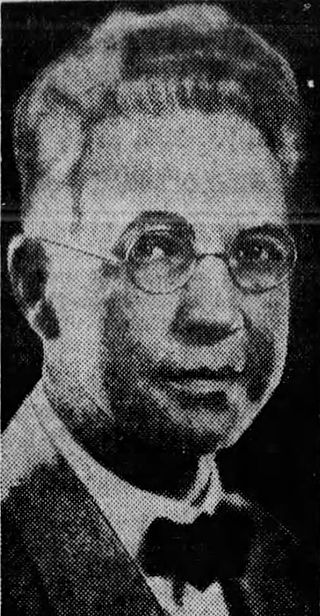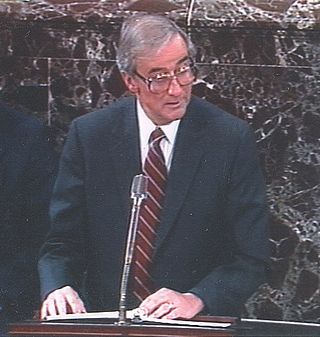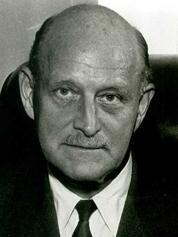Related Research Articles

The New Hampshire Supreme Court is the supreme court of the U.S. state of New Hampshire and sole appellate court of the state. The Supreme Court is seated in the state capital, Concord. The Court is composed of a Chief Justice and four Associate Justices appointed by the Governor and Executive Council to serve during "good behavior" until retirement or the age of seventy. The senior member of the Court is able to specially assign lower-court judges, as well as retired justices, to fill vacancies on the Court.
The charge of high crimes and misdemeanors covers allegations of misconduct by officials. Offenses by officials also include ordinary crimes, but perhaps with different standards of proof and punishment than for non-officials, on the grounds that more is expected of officials by their oaths of office.

Harry Eugene Claiborne was a United States district judge of the United States District Court for the District of Nevada from 1978 until his impeachment and removal in 1986. Appointed by President Jimmy Carter in 1978, Claiborne was only the fifth person in United States history to be removed from office through impeachment by the United States Congress and the first since Halsted Ritter in 1936.

Halsted Lockwood Ritter was a United States district judge of the United States District Court for the Southern District of Florida. He was the thirteenth individual to be impeached by the United States House of Representatives and the fourth individual to be convicted and removed from office in an impeachment trial before the United States Senate. He was also the last federal official to be impeached by the House of Representatives until Harry E. Claiborne, when he was impeached and removed from office by the Senate for tax evasion in 1986.

Walter Louis Nixon Jr. is a former United States district judge of the United States District Court for the Southern District of Mississippi who in 1989 was impeached by the House of Representatives and removed from office by the Senate. Because Nixon's impeachment was for perjury, the case was cited as a precedent in the impeachment trial of President Bill Clinton.

Otto Arthur Cargill was a prominent lawyer, author, politician and buffalo rancher during Oklahoma's early days. He was mayor of Oklahoma City April 4, 1923 - April 12, 1927.

Stephen Sanders Chandler Jr. was a United States district judge of the United States District Court for the Western District of Oklahoma.
G. T. Blankenship is an American lawyer and Republican politician from Oklahoma. A former member and minority leader of the Oklahoma House of Representatives, he initiated the investigation of corruption on the Oklahoma Supreme Court that resulted in the removal of three justices during the mid-1960s and changing the process by which future justices would be selected. Leaving the House to run for higher office, Blankenship served as the 10th attorney general of Oklahoma. After serving as attorney general, he entered private law practice in Oklahoma City and served two terms on the University of Oklahoma's board of regents.
William A. Berry was a Justice of the Oklahoma Supreme Court from 1958 to 1978. During World War II, Berry survived 33 months as a prisoner of war in Japan. While serving on the supreme court, he revealed corruption that became a major political scandal.
Napoleon Bonaparte Johnson was born on January 17, 1891, in Maysville, Oklahoma. He was the oldest child of John Wade and Sarah Johnson, who had three other children, as well. John Johnson was half Cherokee, and his wife was white, making Napoleon and his siblings one-quarter Cherokee. The father was a professional stock trader and an elder in a local Presbyterian church. John raised his son like any other native Cherokee boy and saw to it that he started his education in a local Presbyterian mission school. He moved to Claremore in 1905, which he called his home most of his life. His formal education ended with a Bachelor of Laws (LL.B.) degree at Cumberland University.
Samuel Earl Welch, more commonly written as Earl Welch was a native of Indian Territory, born in 1892, near the present town of Wister, Oklahoma in the present LeFlore County, Oklahoma. He was the second-oldest of nine children born to Charles Arthur Welch (1871-1927) and Mary Adelia Morton (1870-1930). His early education was in schools at Poteau, Talihina, and Antlers. He attended Hargrove College in Ardmore, in 1905-07, then the University of Arkansas in 1908-9 He attended the newly-founded University of Oklahoma School of Law in 1909-11, but dropped out before graduation because of inadequate finances. He completed his legal education by reading the law in the office of his father and grandfather, and was admitted to the bar in 1911.
N. S. Corn, also known as Nelson S. Corn or Nelson Smith Corn, (1884–1967) was a justice on the Oklahoma Supreme Court who was one of the central figures of the Oklahoma Supreme Court Scandal that occurred during the mid-1960s. He was accused of income tax evasion, impeached, tried, convicted, and sentenced to a prison term. During his imprisonment, he prepared a document confessing to his crimes and also provided evidence that led to the resignation or impeachment of additional justices for financial crimes while serving on the court, as well as causing the Oklahoma Legislature to reform the selection of Supreme Court justices.

In the United States, federal impeachment is the process by which the House of Representatives charges the president, vice president, or another civil federal officer for alleged misconduct. The House can impeach an individual with a simple majority of the present members or other criteria adopted by the House according to Article One, Section 2, Clause 5 of the U.S. Constitution.
References
- ↑ Jones, W. Jay (1968). "Res Judicata- The Effect of the Oklahoma Supreme Court Scandal". Tulsa Law Review. 5 (1): 71. Retrieved 24 March 2024.
- 1 2 3 4 5 6 Burke, Bob (May 2023). "From the Ashes of Scandal Came Court Reform". Oklahoma Bar Journal. 5. Retrieved 24 March 2024.